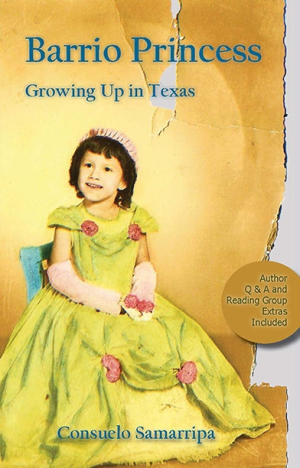Barrio Princess
Growing Up in Texas
Told with easygoing confidence, this woman’s story of life on the border of many cultures is a pleasure to read.
The opening pages of Consuelo Samarripa’s memoir, Barrio Princess: Growing Up in Texas, begin with her recounting traditional healing methods used in the Mexican culture in which she grew up. Those healers, themselves, drew upon ancient healing methods of the Aztecs. Samarripa goes on to describe, in her easy style, the healing teas she drank as a child, and sets a perfect tone for the book as one of a comforting point of entry into a life finely observed and lived.
Samarripa’s memoir follows, in an episodic fashion, her coming of age from childhood to motherhood. It follows a flowing structure, relating stories that follow characters and themes and ultimately cumulate in a satisfying portrait of a life lived between two cultures. The author beautifully weaves together the culture of the American South in the 1950s and the seemingly timeless culture of Mexican Indians.
The author was raised near San Antonio, Texas, and went on to put herself through college after beginning to learn English. She now serves on the board of the Texas Storytelling Association, and the emphasis on storytelling rather than a strict creative nonfiction narrative structure makes this memoir a lively and satisfying reading experience.
Samarripa weaves beautiful observations and potent thoughts throughout her easygoing, flowing narrative. In relating a negative exchange with her generally pleasant grandmother, Samarripa teases out the scene in a beautifully wrought observation of her grandmother in the garden: “Like people, sometimes plants can bring peace and grace just by their presence. I found a bit of peace myself that morning, just being in the midst of delphiniums.” The peaceful, patient wisdom that Samarripa gleans from these everyday, often domestic, places are what makes this encounter with her life such a delight to read. “There is never a need to apologize for what we give to one another, especially when we express our love in the giving,” she writes.
Much of Samarripa’s life is lived on the boundary of her Mexican ancestry and her Texan home, between the peace of her home and the striving of modern life as she educates herself and makes her way in the world. Rather than betray a tension between these two worlds, her effusive and comfortable style treats both worlds, and her way through them, with a curiosity and openness that is infectious.
All Spanish phrases are translated into English. The writing style is incredibly satisfying, told through the voice of a wonderful storyteller or family member.
Early in the book, Samarripa relates her interactions with her grandmother. Every day when she saw her grandmother, young Samarripa was greeted in the same fashion: “‘Buenos días, mi reina.’ [Good morning, my queen] … Now, if you ask me, by all comparisons, there is no better way a grandmother can build self-esteem in her granddaughter. She was way ahead of her time with esteem building. She was wise that way.”
This daily exchange is summed up so beautifully by Samarripa—it ties back to the title, in her reference to herself as a princess, and also to the happy circumstances of her childhood that imbued her with the easygoing confidence that makes the book a pleasure to read.
Reviewed by
Natasha Gilmore
Disclosure: This article is not an endorsement, but a review. The publisher of this book provided free copies of the book and paid a small fee to have their book reviewed by a professional reviewer. Foreword Reviews and Clarion Reviews make no guarantee that the publisher will receive a positive review. Foreword Magazine, Inc. is disclosing this in accordance with the Federal Trade Commission’s 16 CFR, Part 255.


